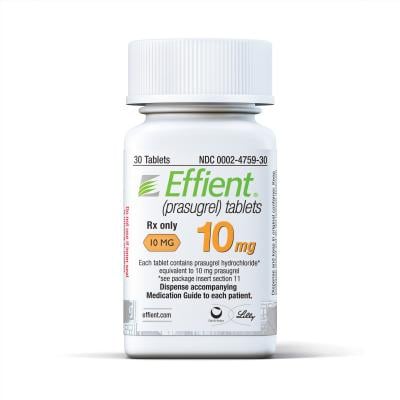
September 9, 2019 — Prasugrel is superior to ticagrelor for reducing ischemic events in patients with acute coronary syndrome and a planned invasive strategy. The late-breaking results of the ISAR-REACT 5 trial were presented in a Hot Line Session at the European Society of Cardiology (ESC) Congress 2019, Aug. 31-Sept. 4 in Paris, France together with the World Congress of Cardiology and published in the New England Journal of Medicine.[1] There was no increase in the rate of major bleeding with prasugrel.
In acute coronary syndromes, a dual antiplatelet regimen with a P2Y12 receptor antagonist plus aspirin is the cornerstone of treatment. Prasugrel and ticagrelor provide greater, more rapid and consistent platelet inhibition compared to their predecessor clopidogrel. Both drugs are recommended over clopidogrel for 12 months after percutaneous coronary intervention (PCI) in acute coronary syndrome patients with and without ST-segment elevation (STEMI and NSTE-ACS, respectively)[2]. Until now, the relative merits of ticagrelor versus prasugrel for the one-year treatment of acute coronary syndrome patients were unknown.
The ISAR-REACT 5 trial[3] tested the hypothesis that ticagrelor is superior to prasugrel in reducing the primary composite endpoint of death, myocardial infarction or stroke within 12 months in acute coronary syndrome patients intended for an invasive strategy. A total of 4,018 patients were enrolled from 23 centers in Germany and Italy and randomly allocated to prasugrel or ticagrelor.
Patients assigned to ticagrelor received a loading dose as soon as possible after randomization. In other words, the timing of study drug administration was irrespective of clinical presentation and knowledge of coronary anatomy. In the prasugrel group, the timing of study drug initiation depended on clinical presentation. STEMI patients received prasugrel as soon as possible after randomization (i.e. they were pretreated). In patients with NSTE-ACS, administration of the prasugrel loading dose required knowledge of the coronary anatomy.
The primary composite endpoint of death, myocardial infarction or stroke at 12 months occurred in 9.3 percent of patients in the ticagrelor group and 6.9 percent in the prasugrel group (hazard ratio [HR] 1.36; 95 percent confidence interval [CI] 1.09–1.70; p = 0.006).
The incidence of the individual components of the primary endpoint in the ticagrelor and prasugrel groups was 4.5 percent versus 3.7 percent for death, 4.8 percent versus 3 percent for myocardial infarction, and 1.1 percent versus 1 percent for stroke. Definite or probable stent thrombosis occurred in 1.3 percent of patients assigned to ticagrelor and 1 percent assigned to prasugrel, and definite stent thrombosis in 1.1 percent versus 0.6 percent of patients, respectively.
The increase in anti-ischemic efficacy with prasugrel was not accompanied by a raised bleeding risk. Bleeding (BARC class 3 to 5) was observed in 5.4 percent of patients in the ticagrelor group and 4.8 percent of patients in the prasugrel group (HR 1.1; 95 percent CI 0.8–1.5; p = 0.46).
Principal investigator Prof. Stefanie Schuepke of the German Heart Centre Munich said, “In this investigator-initiated, multicentre, randomised clinical trial of invasively treated acute coronary syndrome patients, prasugrel significantly reduced the composite rate of death, myocardial infarction, or stroke compared to ticagrelor with no rise in the rate of major bleeding.”
For more information: www.escardio.org
References
1. Schüpke S., Neumann F-J., Menichelli M., et al. Ticagrelor or Prasugrel in Patients with Acute Coronary Syndromes. New England Journal of Medicine, published online Sept. 1, 2019. DOI: 10.1056/NEJMoa1908973
2. 2018 ESC/EACTS Guidelines on myocardial revascularization. Eur Heart J. 2019;40:87–165. doi:10.1093/eurheartj/ehy394.
3. ISAR-REACT: Intracoronary Stenting and Antithrombotic Regimen: Rapid Early Action for Coronary Treatment.


 August 28, 2023
August 28, 2023 









